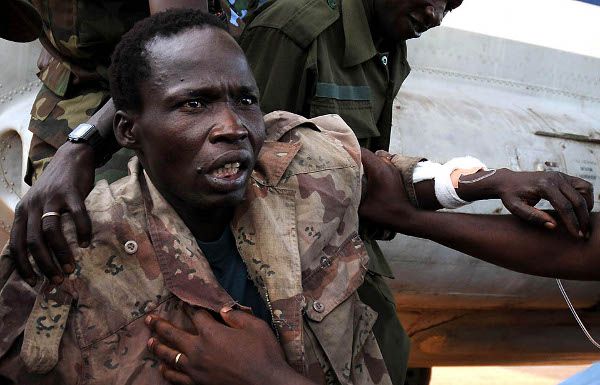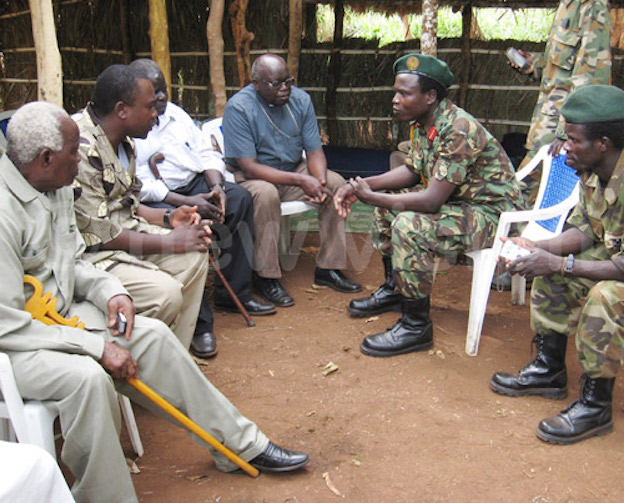It was just a few short weeks ago, following the collapse of the case against Kenyan President Uhuru Kenyatta, that many were predicting that the International Criminal Court (ICC) was on the precipice of irrelevance. But the world of international criminal justice has been rocked by reports that a senior commander of the notorious Lord’s Resistance Army (LRA) is in US custody. And here’s the juicy bit: Dominic Ongwen is indicted by the ICC for war crimes and crimes against humanity committed in northern Uganda. Ten years after the ICC intervened in northern Uganda, could an LRA commander finally be heading to The Hague? That is certainly the hope of many. But here are five reasons why the news of Ongwen’s reported surrender will likely spur uncertainty and controversy.
1) Ongwen, as many have pointed out on Twitter and elsewhere, is both a victim and a perpetrator of international crimes. According to the Justice and Reconciliation Project, Ongwen was abducted by the LRA at the age of 10. Before he emerged as a trusted and senior member of Joseph Kony, Ongwen “was trained as a ‘child soldier’ to fight against the Government of Uganda and forced to kill, mutilate, loot from and rape civilians.” Ledio Cakaj, a leading researcher of the LRA, has called Ongwen’s story “tragic” and one which “encapsulates many of the complexities surrounding the LRA conflict.”
The prosecution of child soldiers, as Mark Drumbl has eloquently and cogently argued, is deeply controversial. Any prosecution of Ongwen will bring these controversies to the fore and force observers and proponents of international justice to confront a difficult question: when is a victim a perpetrator and a perpetrator a victim? The line is much more murky than we tend to assume.
2) It is far from clear that Ongwen will ever end up at the ICC. The United States (which currently has custody of Ongwen) may not be in the mood to cooperate with the Court, especially after Palestine signed the Rome Statute – something the US was steadfast against. As David Kaye has recently pointed out, it also isn’t clear how deep the oft-reported affection between the Obama administration and the ICC truly is. It thus seems precarious (at best) to assume that Ongwen would be surrendered to the ICC in the way that Bosco Ntaganda, indicted by the ICC for atrocities committed in the Eastern DRC, was in 2013.
3) The most likely scenario is that the US will surrender Ongwen to Uganda, with whom it has been working to ‘hunt’ Joseph Kony and LRA fighters since 2012. But again, it is far from obvious that the Government of Uganda would be inclined to flip Ongwen over to the ICC. In recent months, Uganda President Yoweri Museveni has emerged as the single most virulent opponent of the Court – and not just on the African continent. He has gone so far as to declare that African states should ‘quit’ the ICC. Given Museveni’s nasty rhetoric towards the Court, it seems virtually impossible to imagine that he would cooperate with the ICC in surrendering Ongwen.
Of course, that doesn’t change the fact that Uganda has a legal obligation, as a member-state of the ICC, to surrender Ongwen to The Hague. So what will Museveni do? He has a number of options, including having the US surrender Ongwen (via a third party) to the ICC thus allowing him to save face. But this too seems unlikely. It would be hard to pass up having one of the most senior LRA commanders paraded around in court and legitimating the Ugandan army’s ongoing military excursions into neighbouring states. But, in truth, we can only speculate. For the moment, it isn’t clear what Uganda will do. Still, recent tensions between the Ugandan President and the Court could lead to a very nasty confrontation over Ongwen’s fate.

The trial of Thomas Kwoyelo, seen here shortly after his capture, has been beset by controversy (Photo: Reuters / James Akena)
4) One approach that Uganda could take is to challenge the admissibility of the ICC’s case against Ongwen. The government could argue that it is fully able to prosecute the LRA commander itself. Some will argue that Uganda will still be required to surrender Ongwen to the ICC until Judges agree that Uganda could proceed with a prosecution but, as Kevin Jon Heller points out, the Libya precedents make such an obligation unclear.
Here it is important to recall that Uganda did not refer the LRA (later reinterpreted as the situation in northern Uganda) to the ICC because of the state of their judiciary. Rather, they did so because the LRA was residing in neighbouring states to the north and Uganda was unable to capture them there. Indeed, there was a widespread sense within the Ugandan army and government that the ICC’s involvement might precipitate a wider, international military engagement in support of Uganda.
Following the collapse of the Juba Peace Talks (2006-2008), Uganda set up an International Crimes Division (ICD) to prosecute those responsible for serious crimes in northern Uganda. The government could insist that the ICD is the right place for Ongwen to be tried. Will the ICC agree? It might insofar as it has put a premium on demonstrating that one of its primary goals is pursuing “positive complementarity” – i.e. instigating domestic prosecution of international crimes. The problem, however, is that the ICD’s record (which really amounts to one trial) has been mixed (to put it lightly) and both politically and legally contentious. And compounding matters…
5) … the 2000 Amnesty Law is still in place. Crucially, despite numerous opportunities to amend the law in order to exclude LRA commanders indicted by the ICC, the amnesty remains a blanket amnesty. It applies, in its current form, to any rebel who renounces rebellion. Ongwen, having surrendered to US troops will almost surely renounce rebellion and immediately request an amnesty. Under Ugandan domestic law, he has every right to. Human rights and international justice advocates unsurprisingly despise the fact that Uganda retains an amnesty law for alleged perpetrators of mass atrocities. Their disdain was apparent in the case of Thomas Kwoyelo, the only LRA commander to ever be prosecuted for his role in the war. Kwoyelo, too, renounced rebellion and applied for an amnesty certificate. However, while his prosecution was deemed to violate his right to equality before the law, the diminutive former commander remains in Luzira prison.
Proponents of international criminal justice and human rights are undoubtedly excited about the prospect of a senior LRA commander being transferred and tried at the ICC. But, as with every potential war crimes trial, complexities and controversies abound. That’s the nature of the beast. One thing is for sure, though: these are (still) fascinating times for the world of international criminal justice.



Pingback: The Complexities of Dominic Ongwen’s Reported Surrender | Backslash Scott Thoughts
Specifically to your first numbered point, is Ongwen’s past at all relevant to the admissibility of the criminal case at the ICC? I would think not. His extraordinary and unfortunate past as a child soldier does not negate his culpability. He has not been indicted for acts that took place when he was a minor (which the Rome Statute prohibits), he has been indicted for acts done when he was an adult. However, I do think that his upbringing would be a mitigating factor during, although I’m unfamiliar with any case law on the subject.
Pingback: #JusticeGlobal Hebdo: La société civile acceuille la Palestine en tant que 123e Etat membre de la CPI |
Pingback: The complex story of a child soldier - The Washington Post
Pingback: The White Ant Dilemma: Is the LRA Brigadier Commander Dominic Ongwen a victim or a perpetrator? | Fruitful Politics
Pingback: Dominic Ongwen and the slow-grinding wheels of the International Criminal Court |